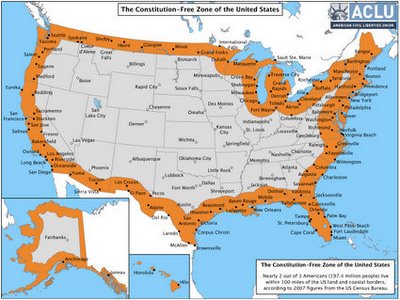Last week, my family drove back to Arizona from a conference in San Diego. We took Interstate 8, a major highway that runs within a couple of miles of the border in California, but diverges from the boundary with Mexico in Arizona. Somewhere east of Yuma, we were stopped at a roadblock.
Traffic crawled through a gauntlet of official vehicles in green-and-white livery before coming to a complete halt. A Border Patrol agent came to the window and stared hard at all of us -- my wife, my three-year-old son and yours truly. I bit my tongue while my kid did his best to look sinister. My wife just responded with a curt "yes" when the agent asked if we are all citizens.
Then we continued on.
This wasn't the first time we've been brought to a stop in the middle of the desert by uniformed men. Border Patrol checkpoints are an all-too-common occurrence in this part of the world. In fact, if you haven't hit one yet, you should probably get prepared. While these checks are supposedly particular to the border, the government interprets "border" loosely, to cover areas up to 100 miles from the international boundary. As the ACLU
points out, that "Constitution-free zone" includes nine of the nation's 10 major urban areas, and almost two-thirds of the population.
The last time my family hit one of these checkpoints was in California, also on I-8. The agents set up temporary stations in the middle of nowhere, far from turn-arounds and exits, stop and quiz everybody who passes. If you don't raise their suspicions or tick them off, you go on your way. If you're less lucky ... well ... there's not a lot of shade out there while they interrogate you and toss your vehicle.
We've never been asked for proof of citizenship, and I'm not sure what we would do if we were. Like most folks, we don't travel with our birth certificates and passports. In fact, my wife has never
had a passport. Basically, we're skating on our accent-free English and non-Hispanic, non-Middle Eastern appearances.
That's not a lot to hang your hat on. The ACLU cites the case of "Vince Peppard, a San Diego retiree who with his wife was stopped by the authorities on a road east of San Diego, at least 15 miles from the U.S. border. Peppard and his wife proved they were U.S. citizens but still found themselves subject to demands that they allow a search, interrogated, threatened and harassed."
In Washington state, farmers complain that inland citizenship checks on Olympic Peninsula are
scaring their workers away. "We're very unhappy with the feds," said Dan Fazio, director of employer services for the Washington Farm Bureau. "We believe these roadblocks violate the constitution, be it the federal or the state's."
Yeah, that's sort of near the border with
Canada.
Border Patrol agents' sometimes abusive attitude toward their captive audience has been a matter of controversy. Rep. Norm Dicks of Washington
complains, "Gruffness: that has turned people off. They need to try to treat people nicely, not try to terrify people."
But rudeness is the least of it. People taken into custody by Border Patrol have
compained of mistreatment including: the denial of food, water and medical treatment; physical and verbal abuse; separation of families; and the failure to return belongings.
And it's always encouraging to be stuck in a line crawling its way toward a checkpoint, knowing that confrontations between Border Patrol and motorists sometimes
turn violent, as one did earlier this month near San Diego. Who doesn't want to be there when the bullets start flying?
Well, me for one. But there's nothing I can do about getting stopped if I want to travel around Arizona and southern California.
But I can make sure that we have proof of citizenship; we're all getting passports, and I guess we'll have to keep them in the car with us.
That's the United States in 2008: carrying passports with you so you can travel within the borders of your own country with a little hope of escaping abuse at the hands of the authorities.
Labels: civil liberties, kop kapers, race for the border




